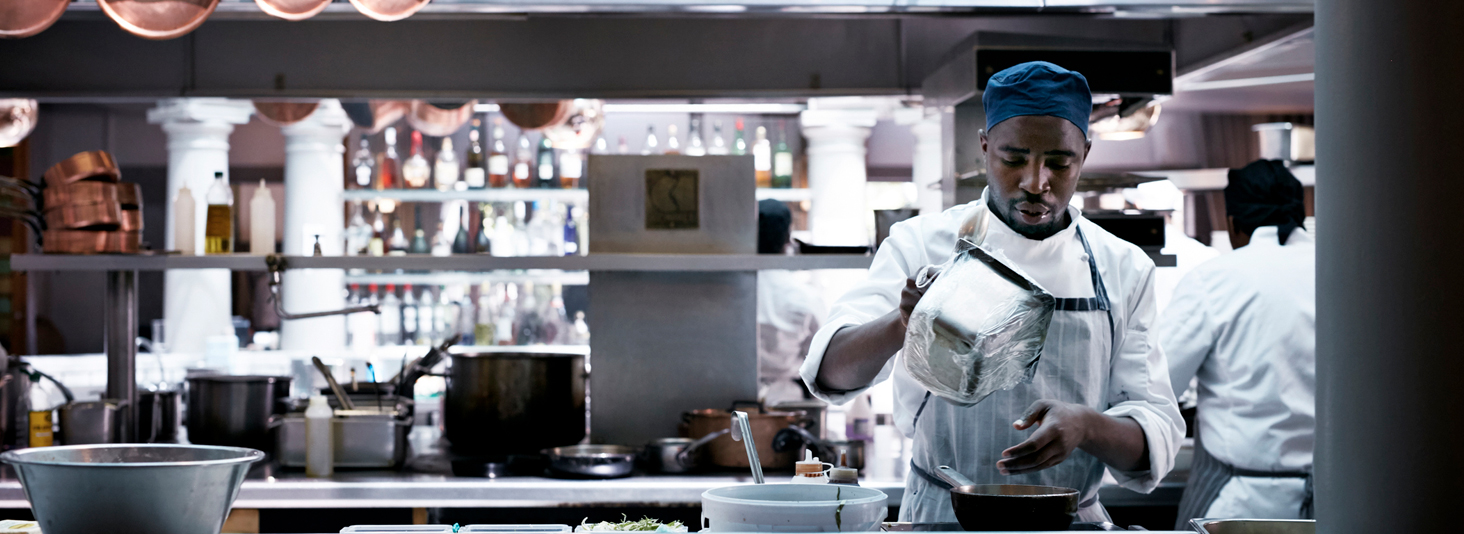Key Restaurant Insurance Coverages Include
Covers third-party injuries, property damage and legal costs from common incidents like slip-and-falls or food-related illness.
Example: A customer trips on a loose rug and sues for medical expenses. General liability helps cover the claim.
Protects against claims related to serving alcohol, including alcohol-related incidents involving patrons.
Example: A patron leaves intoxicated and causes a car accident. Liquor liability helps cover legal fees and damages.
Required in most states, this covers medical expenses and lost wages if employees are injured on the job, whether in the kitchen or front of house.
Example: A line cook suffers a serious burn during service. Workers’ comp pays for treatment and recovery time.
Reimburses for lost inventory caused by power outages or equipment failure that leads to spoiled or contaminated food.
Example: A broken walk-in freezer results in the loss of high-value inventory. Spoilage coverage reimburses the loss.
Protects against financial and reputational harm from data breaches, POS hacks, ransomware or stolen customer information.
Example: Hackers breach your payment system and steal customer credit card data. Cyber insurance helps cover the response.
Covers company-owned or employee vehicles used for deliveries, catering or business errands.
Example: An employee crashes while delivering lunch orders. Commercial auto covers vehicle damage and liability claims.
Streamline your business operations with HUB Franchise Insurance Solutions
HUB offers an automated technology platform providing guidance on certificate and insurance options to reduce your risk and maintain compliance.
FAQs
Restaurant insurance typically includes general liability, commercial property and business interruption coverage. Most policies also cover workers’ compensation, especially where physical labor or customer interaction is involved. If you serve alcohol, liquor liability is essential. Many restaurants add cyber insurance to protect against cyber threats targeting POS systems or customer data. Equipment breakdown and commercial auto coverage can also be included. Each policy is customizable based on your restaurant’s size, services and risks. HUB can help tailor the right protection for your operation.
Yes, restaurant insurance can cover both foodborne illness and food spoilage, depending on your policy. General liability may help if a customer becomes sick from contaminated food. Spoilage caused by equipment failure or power outage is typically covered under an equipment breakdown or spoilage endorsement. These protections can reimburse you for lost inventory and help limit business disruption. Coverage is not always automatic, so it’s essential to review your policy carefully or consult an advisor to determine if you are fully protected.
Liquor liability is not automatically included in a standard restaurant policy. You need it if your business sells, serves or allows alcohol on the premises. This coverage helps protect you if a customer causes harm after drinking at your restaurant. Many states require it for a liquor license. Even if it’s not mandated, it is still an important layer of protection. Without it, your business could face major legal and financial risk.
Yes, if your restaurant offers food delivery, you likely need commercial auto insurance. Personal car insurance usually excludes business use, which leaves a coverage gap. Commercial auto policies protect your business from accidents involving company-owned or employee vehicles used for deliveries. If your staff uses personal vehicles, you may also need hired and non-owned auto coverage. Even limited delivery operations can introduce significant exposure. HUB can help you choose the right coverage to protect your team and your bottom line.
Cyber insurance can help protect your restaurant if sensitive data is compromised. It usually covers costs tied to data breaches, like customer notifications, credit monitoring, legal fees and system recovery. This is especially important if you use POS systems or take online orders. Some policies also include coverage for ransomware or payment fraud. Cyber risks are growing for restaurants of all sizes, especially those using online ordering or digital payment systems.
Your insurance premium is based on several factors, including your location, revenue and type of food service. Serving alcohol, offering delivery or operating late at night can raise your risk level and your cost. Your claims history and safety measures, such as kitchen safety protocols or staff training, also play a role. How much coverage you choose and any endorsements you add will affect the final price.
Business interruption insurance should cover lost income and fixed costs if your restaurant must close due to a covered event like a fire or storm. It typically pays for rent, payroll, utilities and other necessary expenses while operations are paused. Some policies also include extra expense coverage to help you reopen faster, like renting temporary space. Pandemic-related closures are typically excluded unless explicitly endorsed.







